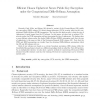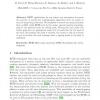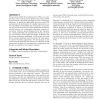8 search results - page 1 / 2 » How to Enhance the Security of Public-Key Encryption at Mini... |
PKC
1999
Springer
13 years 8 months ago
1999
Springer
This paper presents a simple and efficient conversion from a semantically secure public-key encryption scheme against passive adversaries to a non-malleable (or semantically secure...
ASIACRYPT
2008
Springer
13 years 6 months ago
2008
Springer
Recently Cash, Kiltz, and Shoup [20] showed a variant of the Cramer-Shoup (CS) public key encryption (PKE) scheme [21] whose chosen-ciphertext (CCA) security relies on the computa...
CHES
2007
Springer
13 years 10 months ago
2007
Springer
RFID applications do not always use encryption to ensure the security as public key cryptographic algorithms that are costly in term of computing resources. We proposed to secure t...
ASIACRYPT
2001
Springer
13 years 8 months ago
2001
Springer
In this paper we formalize the notion of a ring signature, which makes it possible to specify a set of possible signers without revealing which member actually produced the signatu...
EUROPKI
2006
Springer
13 years 8 months ago
2006
Springer
Privacy-aware Public Key Infrastructure (PKI) can maintain user access control and yet protect user privacy, which is envisioned as a promising technique in many emerging applicat...



